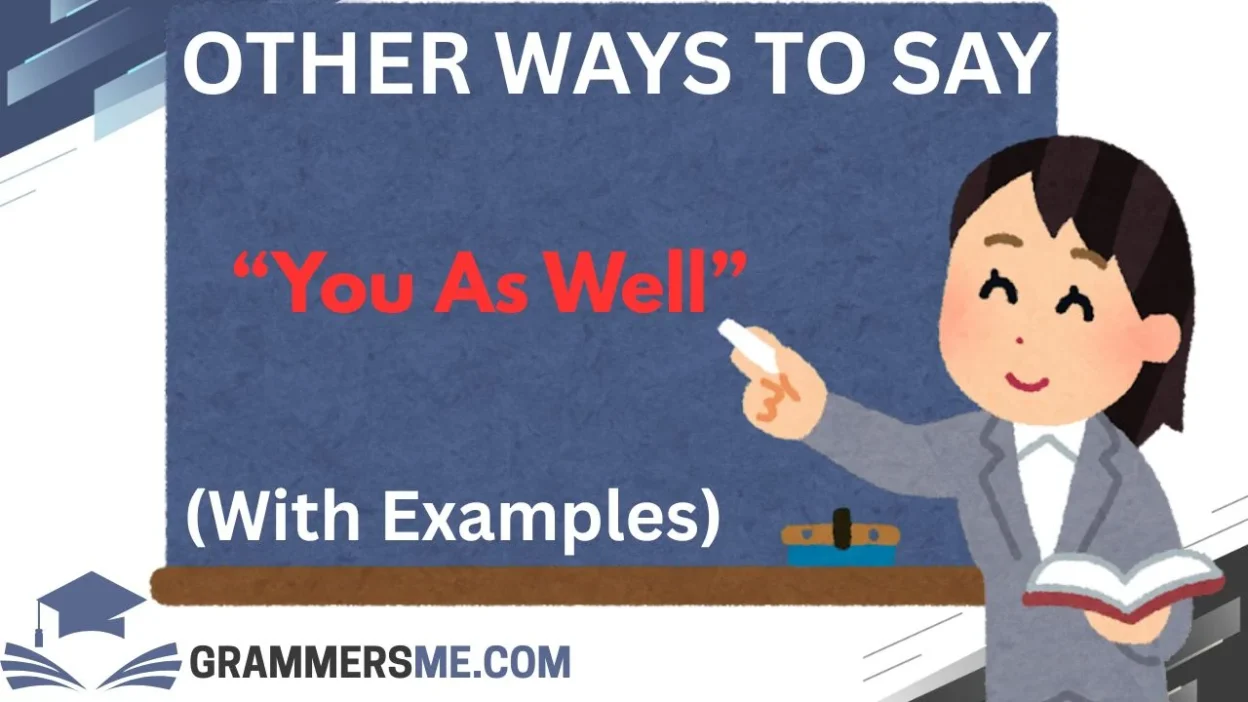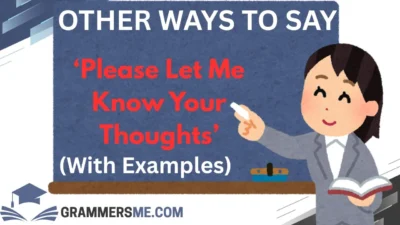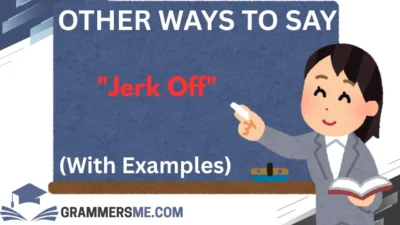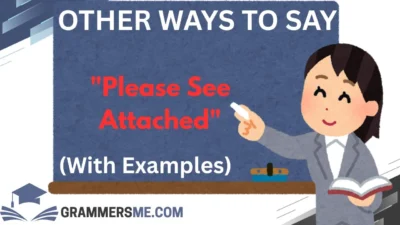When we communicate, the words we choose can carry a lot of weight. The right expression not only conveys our message but also shows empathy and care. Sometimes, simple phrases like “You as well” can feel a bit impersonal. That’s where these thoughtful alternatives come in. By using these expressions, we can make our conversations feel warmer and more meaningful, whether we’re responding to a kind wish or simply expressing good intentions. This article will explore 30 other ways to say “You as well”, each designed to add a personal touch to your communication.
What Does “You As Well” Mean?
“You as well” is a phrase often used to return good wishes or show that you wish the same for someone else. It’s a way to mirror or reciprocate positive feelings in a conversation. While it’s commonly used in casual settings, there are many other ways to express this sentiment that can feel more tailored and thoughtful, depending on the situation.
Is It Professional/Polite to Say “You As Well”?
Yes, “You as well” is polite and professional in most contexts. It’s often used in casual conversations or to mirror wishes in a positive and respectful manner. However, depending on the level of formality required in a professional setting, there may be more formal alternatives to consider. When in doubt, adjusting the tone or choosing a more formal phrase can ensure your message remains both respectful and sincere.
1. Same to You
Meaning: A direct yet friendly way to return a wish or greeting.
Explanation: This phrase is informal and used to reflect the good wishes someone has expressed to you. It’s slightly more personal and approachable than “You as well.”
Scenario Example:
- Person A: “Have a great weekend!”
- Person B: “Same to you!”
Best Use: Informal or casual settings, among friends or peers.
Tone: Friendly, casual.
Not Use: In formal settings or when communicating with higher-ups or elders.
2. Wishing You the Same
Meaning: A warm way of reciprocating well wishes.
Explanation: This alternative emphasizes that you hope the other person experiences the same positive outcome they wished for you.
Scenario Example:
- Person A: “Enjoy your holiday!”
- Person B: “Wishing you the same!”
Best Use: Casual to semi-formal interactions.
Tone: Warm, friendly.
Not Use: Highly formal situations.
3. I Hope You Do Too
Meaning: A slightly more thoughtful and reflective way of reciprocating a wish.
Explanation: This phrase conveys a sense of care, indicating you genuinely hope the person enjoys the same thing or experiences the same positive outcome.
Scenario Example:
- Person A: “Take care!”
- Person B: “I hope you do too!”
Best Use: Informal and caring settings.
Tone: Empathetic, thoughtful.
Not Use: Strictly professional or formal situations.
4. Likewise
Meaning: A concise and classic way to express reciprocal goodwill.
Explanation: A very common and simple alternative, “Likewise” is effective in nearly every situation.
Scenario Example:
- Person A: “Good to see you!”
- Person B: “Likewise!”
Best Use: Casual or professional settings.
Tone: Polite, neutral.
Not Use: In highly formal communications.
5. I Wish the Same for You
Meaning: A heartfelt way of expressing your hope that the other person experiences the same positive outcome.
Explanation: This is a more formal and thoughtful way of reciprocating a wish.
Scenario Example:
- Person A: “Have a wonderful trip!”
- Person B: “I wish the same for you!”
Best Use: Professional settings or when speaking with someone you respect.
Tone: Formal, respectful.
Not Use: Casual conversations among friends.
6. Enjoy Yourself as Well
Meaning: A casual and friendly way of wishing someone enjoyment.
Explanation: This phrase works well in informal exchanges when someone has expressed excitement about something they’re doing.
Scenario Example:
- Person A: “Have fun at the party!”
- Person B: “Enjoy yourself as well!”
Best Use: Social or friendly exchanges.
Tone: Warm, informal.
Not Use: In formal or professional environments.
7. You Too
Meaning: A very casual and quick way to express the same sentiment.
Explanation: This is a commonly used and versatile expression. It’s friendly but can be slightly informal, so context matters.
Scenario Example:
- Person A: “Have a good day!”
- Person B: “You too!”
Best Use: Casual conversations.
Tone: Light, informal.
Not Use: Formal or business communications.
8. The Same to You
Meaning: An older yet effective phrase to return good wishes.
Explanation: “The same to you” is used to mirror someone’s kind words or sentiments in a friendly and polite way.
Scenario Example:
- Person A: “Enjoy your meal!”
- Person B: “The same to you!”
Best Use: Informal conversations with friends, family, or colleagues.
Tone: Friendly, neutral.
Not Use: High-level formal settings.
9. May the Same for You
Meaning: A slightly more poetic or formal way of expressing well wishes.
Explanation: This phrase carries a sense of warmth and formality, making it appropriate for situations where you’re exchanging more heartfelt or meaningful wishes.
Scenario Example:
- Person A: “Good luck on your presentation!”
- Person B: “May the same for you!”
Best Use: Professional or semi-formal conversations.
Tone: Respectful, warm.
Not Use: Informal situations.
10. Take Care as Well
Meaning: A caring way to wish someone well, especially when they’re leaving.
Explanation: This phrase is commonly used in the context of well-wishing when someone is about to depart or when you’re hoping they stay safe.
Scenario Example:
- Person A: “Take care!”
- Person B: “Take care as well!”
Best Use: Casual or personal settings.
Tone: Warm, caring.
Not Use: In highly professional settings.
11. Sending You Good Vibes
Meaning: A modern, positive way to reciprocate good wishes.
Explanation: “Sending you good vibes” conveys a sense of positivity and energy, making it great for informal, supportive exchanges.
Scenario Example:
- Person A: “Good luck with your exam!”
- Person B: “Sending you good vibes!”
Best Use: Casual, positive exchanges.
Tone: Energetic, supportive.
Not Use: In formal, serious contexts.
12. I Hope You Have a Great One Too
Meaning: A thoughtful way to mirror someone’s well wishes while adding your own personal touch.
Explanation: This phrase is typically used when someone has wished you well for something specific, and you want to express the same in return.
Scenario Example:
- Person A: “Have a wonderful day!”
- Person B: “I hope you have a great one too!”
Best Use: Friendly conversations.
Tone: Warm, reflective.
Not Use: Strictly formal settings.
13. Take Care of Yourself Too
Meaning: A caring way to reflect someone’s well wishes.
Explanation: This phrase is often used when the other person expresses concern or care, and you want to reflect that concern back.
Scenario Example:
- Person A: “Stay safe!”
- Person B: “Take care of yourself too!”
Best Use: Casual and empathetic situations.
Tone: Caring, thoughtful.
Not Use: Professional environments.
14. I Hope It Goes Well for You Too
Meaning: A supportive and considerate way to reciprocate well wishes.
Explanation: This phrase is more thoughtful, expressing genuine care that the other person has a positive outcome.
Scenario Example:
- Person A: “Good luck with your job interview!”
- Person B: “I hope it goes well for you too!”
Best Use: Supportive situations or encouraging exchanges.
Tone: Warm, encouraging.
Not Use: In strictly formal settings.
15. Have a Good One as Well
Meaning: A short, friendly way to return a casual well wish.
Explanation: This phrase is often used when someone wishes you a pleasant day or experience, and you want to reciprocate with the same sentiment.
Scenario Example:
- Person A: “Have a great day!”
- Person B: “Have a good one as well!”
Best Use: Casual interactions.
Tone: Friendly, light.
Not Use: Formal conversations.
16. Best Wishes to You Too
Meaning: A formal and sincere way to return good wishes.
Explanation: This expression is often used when someone offers you good luck or best wishes, and you want to reciprocate with the same sentiment. It’s particularly effective in professional or semi-formal settings.
Scenario Example:
- Person A: “Best of luck with your new project!”
- Person B: “Best wishes to you too!”
Best Use: Professional or semi-formal situations where you’re exchanging well wishes.
Tone: Formal, respectful.
Not Use: In overly casual or familiar settings.
17. I’m Sure You’ll Have a Great Time Too
Meaning: A supportive and encouraging way to reciprocate someone’s excitement or positive expectations.
Explanation: This phrase works particularly well when someone has shared their enthusiasm about something, and you want to reflect that same optimism.
Scenario Example:
- Person A: “Enjoy your vacation!”
- Person B: “I’m sure you’ll have a great time too!”
Best Use: When responding to someone’s excitement, whether it’s about a trip, event, or personal experience.
Tone: Encouraging, optimistic.
Not Use: In overly formal situations.
18. Same to You, My Friend
Meaning: A friendly and familiar way to reciprocate well wishes.
Explanation: This variation adds a personal touch, especially in conversations with close friends or those you have a casual relationship with.
Scenario Example:
- Person A: “Have a fantastic weekend!”
- Person B: “Same to you, my friend!”
Best Use: Casual and friendly exchanges.
Tone: Warm, personal.
Not Use: Professional or formal contexts.
19. Hope You Have an Amazing One Too
Meaning: A thoughtful way to reflect someone’s good wishes while adding a bit of enthusiasm.
Explanation: This phrase is great for situations where you want to show extra excitement or positivity in your response.
Scenario Example:
- Person A: “Enjoy your holiday!”
- Person B: “Hope you have an amazing one too!”
Best Use: Friendly exchanges, especially when you’re excited for the other person.
Tone: Enthusiastic, caring.
Not Use: Strictly professional exchanges.
20. Have a Wonderful Day Too
Meaning: A pleasant and friendly response to someone wishing you well.
Explanation: Simple, yet effective, this phrase works in almost any casual or semi-formal situation.
Scenario Example:
- Person A: “Have a great day!”
- Person B: “Have a wonderful day too!”
Best Use: Casual exchanges, particularly when leaving or ending a conversation.
Tone: Friendly, polite.
Not Use: In formal professional settings where you require more formal language.
21. I Hope Your Day Goes Well Too
Meaning: A caring and reflective way to respond to someone’s well wishes.
Explanation: This phrase adds a thoughtful touch by acknowledging the other person’s experience and wishing the same for them.
Scenario Example:
- Person A: “Hope you have a fantastic day!”
- Person B: “I hope your day goes well too!”
Best Use: Casual settings or when speaking with someone you feel comfortable with.
Tone: Empathetic, thoughtful.
Not Use: In formal or professional conversations.
22. Enjoy Yourself and Stay Safe
Meaning: A warm and considerate way to reciprocate a friendly farewell.
Explanation: This phrase not only wishes someone well but also expresses care for their safety and well-being, making it more personal and thoughtful.
Scenario Example:
- Person A: “Have a fun night out!”
- Person B: “Enjoy yourself and stay safe!”
Best Use: Informal settings, especially when the other person is going out or traveling.
Tone: Caring, considerate.
Not Use: In professional or very formal settings.
23. May You Have a Wonderful Day as Well
Meaning: A slightly formal and refined way of expressing well wishes.
Explanation: This phrase is respectful and positive, making it appropriate for both professional and personal exchanges.
Scenario Example:
- Person A: “Wishing you a wonderful day!”
- Person B: “May you have a wonderful day as well!”
Best Use: Professional settings or semi-formal interactions.
Tone: Polite, respectful.
Not Use: Casual conversations with close friends or family.
24. I Hope Your Day is as Great as Mine
Meaning: A personal way to share your positive experience while wishing the same for the other person.
Explanation: This phrase adds a bit of personal flair, making it a fun and lively alternative.
Scenario Example:
- Person A: “Enjoy your day!”
- Person B: “I hope your day is as great as mine!”
Best Use: Casual and fun conversations with close friends.
Tone: Playful, lively.
Not Use: Formal or professional communications.
25. Looking Forward to the Same for You
Meaning: A thoughtful way to reciprocate wishes while showing anticipation for the future.
Explanation: This phrase works well when someone has expressed a wish for you, and you want to reflect that with an optimistic view of what’s to come.
Scenario Example:
- Person A: “Hope you have a great week ahead!”
- Person B: “Looking forward to the same for you!”
Best Use: Professional or semi-formal exchanges.
Tone: Optimistic, polite.
Not Use: Casual or overly informal situations.
26. Hope It’s as Good for You
Meaning: A way to express hope that the other person experiences something just as positive.
Explanation: This phrase conveys a sense of equality and warmth, making it a nice reciprocal expression of goodwill.
Scenario Example:
- Person A: “Have a great time at the concert!”
- Person B: “Hope it’s as good for you!”
Best Use: Casual settings, especially among peers or friends.
Tone: Warm, friendly.
Not Use: In strictly professional contexts.
27. Wishing You a Fabulous Time as Well
Meaning: A fun and enthusiastic way to return a wish for enjoyment.
Explanation: This phrase adds a bit of excitement, making it perfect for moments of shared happiness or anticipation.
Scenario Example:
- Person A: “Enjoy your vacation!”
- Person B: “Wishing you a fabulous time as well!”
Best Use: Casual, upbeat exchanges.
Tone: Energetic, fun.
Not Use: Formal exchanges or business-related conversations.
28. Here’s to a Great Time for You Too
Meaning: A cheerful and celebratory way to reflect someone’s positive wish.
Explanation: This phrase is slightly more informal and works well when you’re wishing the same kind of positive experience for someone.
Scenario Example:
- Person A: “Have an amazing weekend!”
- Person B: “Here’s to a great time for you too!”
Best Use: Casual, celebratory settings.
Tone: Joyful, enthusiastic.
Not Use: In very formal or professional settings.
29. All the Best to You Too
Meaning: A polite and warm way to return well wishes.
Explanation: This is a common phrase that’s universally accepted in both casual and formal contexts, making it versatile and appropriate for various situations.
Scenario Example:
- Person A: “Good luck with your interview!”
- Person B: “All the best to you too!”
Best Use: Both casual and formal situations.
Tone: Polite, neutral.
Not Use: In overly informal conversations.
30. Hope Everything Goes Your Way Too
Meaning: A positive and supportive way to wish someone the best in their endeavors.
Explanation: This phrase shows your support for the other person and conveys a sense of optimism.
Scenario Example:
- Person A: “Hope your day is wonderful!”
- Person B: “Hope everything goes your way too!”
Best Use: Casual or semi-formal situations.
Tone: Supportive, hopeful.
Not Use: In highly formal professional exchanges.
Conclusion
Finding the right words to express care and goodwill can make a huge difference in the quality of your relationships, whether personal or professional. By varying your phrases and using alternatives to “You as well,” you add layers of warmth, sincerity, and empathy to your communication.
These small changes elevate your conversations, making them more thoughtful and meaningful. With the 30 alternatives provided, you’ll have a range of options to choose from, ensuring that every exchange is not just polite but deeply personal.
FAQs
- Can I use these alternatives in a professional email?
- Yes, many of these alternatives, such as “I wish the same for you” or “All the best to you,” are great for professional communication.
- Yes, many of these alternatives, such as “I wish the same for you” or “All the best to you,” are great for professional communication.
- Are these phrases appropriate for texting?
- Absolutely! These alternatives are perfect for casual and friendly text conversations.
- Absolutely! These alternatives are perfect for casual and friendly text conversations.
- Which alternative should I use for close friends?
- For close friends, more casual phrases like “Same to you” or “Enjoy yourself as well” work wonderfully.
- For close friends, more casual phrases like “Same to you” or “Enjoy yourself as well” work wonderfully.
- Can these alternatives be used for expressing good wishes after an event?
- Yes, phrases like “Hope everything went well for you” or “I’m sure you had a great time” are great post-event alternatives.
- Yes, phrases like “Hope everything went well for you” or “I’m sure you had a great time” are great post-event alternatives.
- How do I decide which alternative to use?
- It all depends on the tone of the conversation and your relationship with the person. For professional settings, choose more formal phrases, while for casual settings, you can be more relaxed and expressive with your words.




